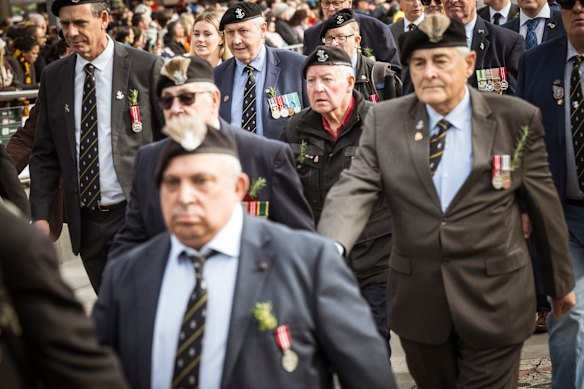As we commemorate the thousands of our countrymen and countrywomen who have given their lives or served in the nation’s armed forces, at home and overseas, there are haunting signs of the 1930s this Anzac Day.
Russia’s Vladimir Putin is doing his best to emulate Hitler, European nations are wondering how to deal with another modern-day authoritarian dictator, and Donald Trump has abandoned the US leadership role to become a curious amalgam of 1930s America and the British prime minister Neville Chamberlain, isolationist and great appeaser at one.
Diggers march on Anzac Day last year.Credit: Chris Hopkins
In such circumstances it’s little wonder that, while they argue over defence spending, both the Minister for Foreign Affairs, Richard Marles, and Opposition Leader Peter Dutton have warned that Australia faced the most complex, the most threatening, strategic circumstances since the end of the Second World War.
The conflicts in Ukraine and Gaza threaten to reflect a world that appears to have forgotten how the US rescued Europe, established the institutions of global order and set the conditions for a long period of prosperity and relative peace.
Anzac Day has a way of reminding us about the imperatives of war and its cost.
Anniversaries somehow make our sense of loss more poignant. It is 80 years since the Second World War ended, 60 years next Tuesday since Robert Menzies announced he would send an Australian battalion to Vietnam and 110 years today since the Diggers went ashore at what would become known as Anzac Cove.
The Herald’s C.E.W. (Charles) Bean, the nation’s official war correspondent, took the people of Australia into battle on the Gallipoli Peninsula, his despatch beginning with a heroic opening paragraph: “The Australians and Maorilanders landed in two bodies, the first being a covering force to seize the ridges around the landing about an hour later. The moon that night set about an hour and a half before daylight. This just gave time for the warships and transports of the covering force to steam in and land the troops before dawn.”
In a truly unique Australian achievement, Bean’s subsequent Official History of Australia in the War of 1914-1918 helped turn defeat in battle into an enduring victory of the spirit that Australians carried through conflict and war, only one of which – the Japanese bombing raids on Darwin and other coastal settlements and the submarine attacks on coastal shipping and Sydney Harbour – saw us under direct military threat.
As conflicts in Ukraine and the Middle East threaten, Australia’s Chief of Army, Simon Stuart, warned the Lowy Institute earlier this month that the next war would not be fought in Europe or the Middle East, but rather the islands and jungles of the Pacific and South-East Asia.
Clearly, we live in the most frightening of peace times in eight decades. Amid such uncertainty, Anzac Day offers inspiration and the solace of remembering achievements of Australians on active service in Europe, Africa, Asia, the Pacific and at home, and celebrates the first Anzac’s values that have endured down the decades and serve us still.
Bevan Shields sends an exclusive newsletter to subscribers each week. Sign up to receive his Note from the Editor.
Read the full article here
